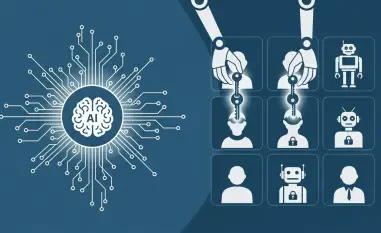Digital operations are set to undergo a revolutionary transformation by 2025, driven by a heightened focus on artificial intelligence (AI) and security. This evolution is not a mere prediction but a data-backed projection from PagerDuty’s fourth annual State of Digital Operations Report. According to the report, digital operations are no longer about managing simple IT infrastructure; instead, they have become key instruments for gaining a competitive edge. The insights were gathered from more than 1,100 operations leaders across North America, EMEA, and Asia-Pacific and Japan (APJ), painting a comprehensive picture of the landscape and future trajectory.
Growing Importance of Operational Resilience
Increasing Budgets and Security Spending
One of the most compelling findings from the report is that a significant 64% of respondents predict an increase in their IT operations budgets by 2025. This financial boost is crucial as the digital landscape becomes more sophisticated and demands higher investment to maintain and improve services. Security spending, in particular, is expected to see dramatic increases, with 71% of respondents indicating that their organizations will allocate more resources to this area. This heightened focus on security is understandable, given the ever-increasing number of cyber threats and the potential damage they can inflict on an organization’s reputation and bottom line.
It’s worth noting that this increased financial commitment is not just a trend but a strategic imperative. Cybersecurity attacks have been growing in both complexity and frequency, making it essential for organizations to invest in the latest security technologies and practices. The emphasis on security spending also reflects a broader understanding that operational resilience goes hand-in-hand with robust security measures. Companies are increasingly aware that without proper security protocols, all other operations are put at significant risk. This dual focus on budget expansion and heightened security measures is expected to lay a strong foundation for resilient digital operations in the years to come.
Advancements in Operational Maturity
The report also highlights substantial improvements in operational maturity, with 74% of organizations reporting advancements in this area. Operational maturity refers to the ability of an organization to handle its IT operations efficiently and effectively, ensuring that all systems run smoothly with minimal disruptions. This progress is a testament to the increasing importance of digital operations and the investments that companies are making to enhance their capabilities. Effective utilization of automation is a key component of this maturity, enabling organizations to streamline processes and reduce the burden on their IT teams.
However, the path to operational maturity is not without its challenges. While many organizations have made significant strides, others still struggle with outdated systems and processes that hinder their ability to achieve the same level of maturity. The report indicates that 35% of respondents identified data security as their primary operational hurdle, underscoring the critical need for ongoing investments in this area. Furthermore, skill and capability development remain a challenge, with 31% of leaders acknowledging difficulties in this domain. Addressing these challenges will be essential for organizations aiming to achieve and maintain high levels of operational maturity.
Divergence in AI Adoption Perspectives
Executive Versus Practitioner Views
A notable finding from the State of Digital Operations Report is the divergence in perspectives on AI adoption between executives and practitioners within organizations. According to the report, 53% of Chief Information Officers (CIOs) and Chief Technology Officers (CTOs) consider AI as a critical element for the future of IT operations. However, this enthusiasm is not uniformly shared across the board, with only 29% of practitioners expressing similar sentiments. This disparity highlights a significant gap in the understanding and implementation of AI technologies within organizations, reflecting the broader excitement around AI and the practical challenges associated with extracting business value from these investments.
The enthusiasm for AI among executives can be attributed to the potential strategic advantages it offers, including improved decision-making, predictive analytics, and enhanced operational efficiency. For practitioners, however, the challenge lies in the practical implementation and integration of these advanced technologies into existing workflows. The perceived complexity and the requisite skills needed to deploy AI solutions effectively may be contributing to the hesitation among practitioners. As PagerDuty’s CTO Armandpour suggests, it is crucial for organizations to identify and evaluate where AI can most effectively enhance operations and deliver a strong return on investment (ROI).
Addressing the Skills Gap
The growing skills gap represents another formidable challenge for the future of digital operations. This issue is particularly pronounced in North America and within the media industry, where the rapid pace of digital transformation has outstripped the available talent pool. The shortage of skilled professionals makes it increasingly difficult for organizations to upskill their existing workforce and attract new talent. The report highlights that if this skills gap is not addressed, it could significantly impede the adoption of new technologies and hinder overall operational progress, making it imperative for organizations to invest in education and training initiatives.
The talent scarcity is exacerbated by the competitive nature of the tech industry, where companies are vying for a limited pool of skilled professionals. This intense competition drives up salaries and benefits, making it even more challenging for organizations to secure the talent they need. Moreover, the complexity of modern IT operations demands a diverse set of skills, from deep technical expertise to strategic planning and management. Bridging this skills gap requires a multifaceted approach, including strong partnerships with educational institutions, ongoing professional development, and a focus on creating an inclusive and attractive workplace environment to retain top talent.
Focus on Security and Automation
Security Concerns and Organizational Alignment
Security has emerged as the top concern for IT operations leaders, with 35% of respondents prioritizing it in their strategic plans. The anxiety is even more pronounced among practitioners, 41% of whom cite security as their main worry. This disparity suggests that there is a need for better alignment between organizational leadership and IT practitioners on security strategies. The heightened focus on security is particularly evident in industries dealing with valuable intellectual property, such as media and technology, where the stakes are exceptionally high.
Effective security strategies necessitate a comprehensive approach that includes both proactive and reactive measures. Proactive measures involve integrating security into the product development cycle through security-by-design principles, ensuring that security considerations are embedded from the outset. Reactive measures include rigorous security incident response practices, which are critical for quickly addressing and mitigating any breaches that do occur. Organizations that excel in these areas are better positioned to maintain operational resilience and build customer trust, essential components for long-term success in the digital age.
Importance of DevOps Automation
The report indicates that the media sector, in particular, has shown remarkable progress in operational maturity, resilience, and automation speed. One of the key factors contributing to this advancement is the high adoption of DevOps automation. This approach involves automating routine activities, allowing engineers and IT teams to focus on higher-priority tasks. DevOps practices have revolutionized the way IT operations are managed, enabling faster development cycles, improved collaboration between teams, and more efficient use of resources. The result is a more agile and responsive operational environment that can quickly adapt to changing business needs.
DevOps automation not only improves operational efficiency but also enhances security by automating compliance checks and security monitoring. This ensures that security standards are consistently met without placing additional burdens on IT teams. The ability to automate these tasks allows organizations to maintain a high level of security while also optimizing their operations. As digital operations continue to evolve, the role of DevOps automation will become increasingly important, providing a scalable and efficient way to manage complex IT environments while ensuring that security remains a top priority.
Future Outlook and Strategic Investment
Projected Budget Increases
The overall optimism about the future is evident, with 64% of organizations expecting increases in their IT budgets by 2025. This projected growth is up seven percentage points from 2024, indicating a strong commitment to investing in digital operations. These budget increases are essential for sustaining the progress made in operational maturity, resilience, and security. Organizations recognize that continuous investment in technology is crucial for maintaining a competitive edge in an increasingly digital world.
Strategic investments in AI, automation, and security will play a pivotal role in shaping the future of digital operations. By leveraging these technologies, companies can optimize their operations, enhance efficiency, and foster innovation. However, it is important for organizations to carefully evaluate where and how these investments are made to ensure they deliver maximum value. This requires a clear understanding of their unique operational needs and challenges and a strategic approach to technology adoption that aligns with their long-term goals.
Conclusion
By 2025, digital operations are expected to experience a groundbreaking transformation, driven by a stronger emphasis on artificial intelligence (AI) and security measures. This shift isn’t just speculation but is supported by data from PagerDuty’s fourth annual State of Digital Operations Report. According to the report, managing digital operations has evolved way beyond handling basic IT infrastructure; it has now become a crucial strategy for securing a competitive advantage in the market. The findings are based on insights from over 1,100 operations leaders spanning North America, the EMEA region, and the Asia-Pacific including Japan (APJ). These insights collectively provide a detailed overview of the current state of digital operations and forecast their future direction. The transformation is proving that the role of digital operations is pivotal in driving business growth and securing a competitive edge. As AI and security take center stage, companies must adapt to these changes to stay ahead in the evolving digital landscape.













